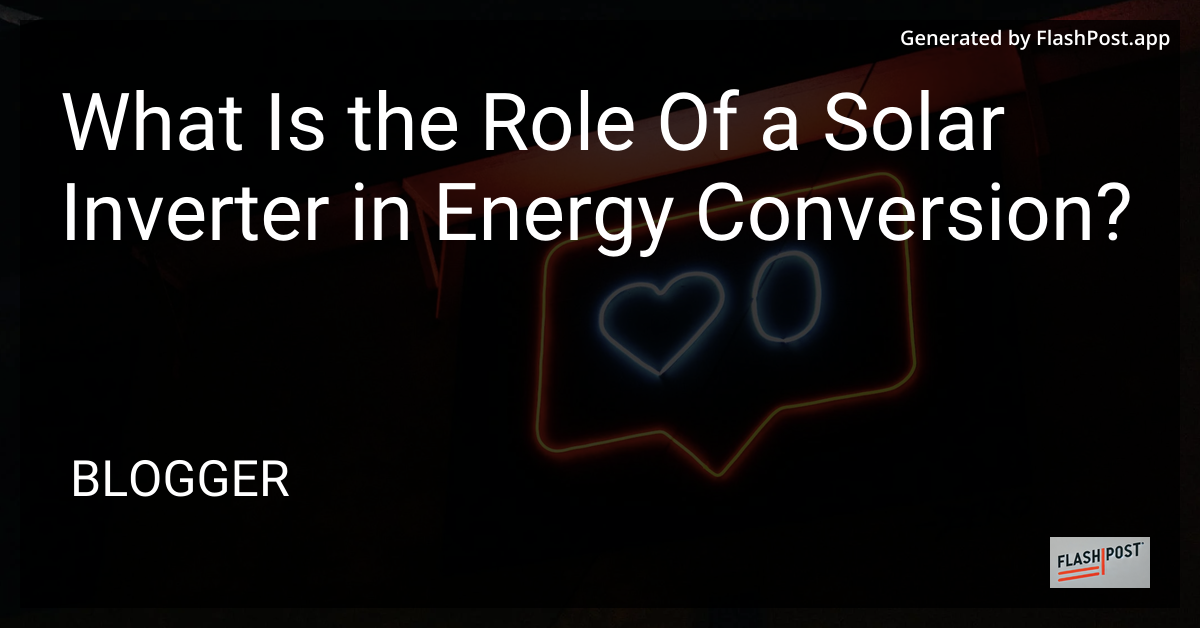What Is the Role Of a Solar Inverter in Energy Conversion?

What is the Role of a Solar Inverter in Energy Conversion?
As the world shifts towards renewable energy sources, solar power has become an increasingly popular option for sustainable energy production. A critical component of any solar power system is the solar inverter, which plays a pivotal role in energy conversion. This article explores the function and importance of solar inverters, and how they contribute to efficient solar energy systems.
Understanding Solar Inverters
Solar inverters are essential devices that transform the direct current (DC) electricity generated by solar panels into alternating current (AC) electricity. AC power is the standard form of electricity used by households and businesses worldwide. Without the conversion provided by solar inverters, solar energy systems would be inefficient and incompatible with existing electrical infrastructure.
Types of Solar Inverters
There are several types of solar inverters available, each designed to optimize energy conversion for specific applications:
String Inverters: Commonly used in residential and commercial installations, string inverters connect a series of solar panels, or “strings,” into one device. This type of inverter is cost-effective, but a fault in one panel can affect the performance of the whole string.
Microinverters: These devices are installed on each solar panel individually, allowing for more precise energy conversion and performance tracking. Microinverters are ideal for installations where panels may be shaded or oriented in different directions.
Hybrid Inverters: These inverters can manage energy from solar panels, batteries, and the electricity grid. They offer flexibility and are suitable for homes and businesses looking to incorporate energy storage systems.
The Role of MPPT in Solar Inverters
Maximum Power Point Tracking (MPPT) is a crucial feature in solar inverters. It ensures that the solar panels operate at their optimal power output level. MPPT continuously adjusts the electrical operating point of the modules to guarantee maximum energy harvest, even under varying environmental conditions such as shading, temperature changes, or mismatched solar panel orientations.
Benefits of Solar Inverters
Efficiency and Reliability: By converting DC to AC power, solar inverters enhance the efficiency of solar energy systems, allowing them to meet the demands of modern electrical consumption.
Monitoring and Diagnostics: Advanced solar inverters offer features that enable system performance monitoring and diagnostics, allowing users to optimize energy use and detect potential issues early.
Integration with Smart Homes: Many modern solar inverters are designed to integrate seamlessly with smart home systems, facilitating energy management and consumption tracking.
Conclusion
Solar inverters are indispensable in the realm of renewable energy. They ensure that the energy produced by solar panels is efficiently converted and usable by everyday appliances and systems. Whether you’re considering solar panel installation in Washington, DC, exploring solar flashlight charging, or thinking about solar-powered patio umbrellas, understanding the role of solar inverters will aid in leveraging solar energy to its fullest potential.
For those planning to install a solar energy system, it’s critical to select the right type of inverter to optimize performance and maximize energy savings.
Comments
Post a Comment